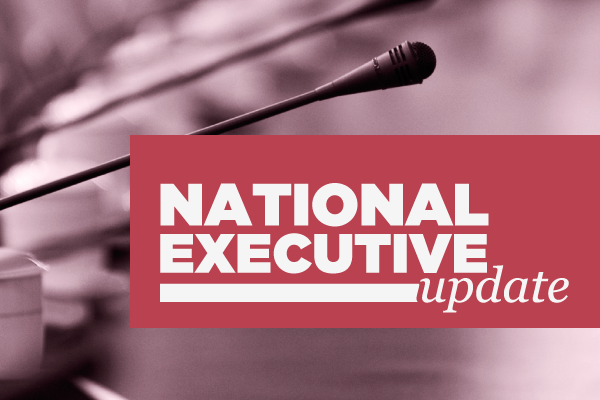
A pretty jam-packed national executive meeting was held last month in Ottawa. While the city was caught in the deadly grip of a deep freeze, our union leaders were fired up and ready to get to the important business of running our union.
“I found it rather intense,” admitted Hayley Millington, who was just recently elected the national equity representative for women.
Understandably, it was particularly intense for Millington because this was her first time attending a meeting of the National Executive.
“There’s a lot of information to process,” Millington added. “But I also found it really impressive. There were so many different characters around the table, but they were able to work together to get the job done.”
“Everyone is different but everyone’s goal is the same.”
And, certainly one of the key goals, as of late, is engaging our membership. During the meeting, the National Executive recommitted itself to reach out to as many members as possible as part of the pledge card campaign.
Related: Watch Robyn Benson’s video about the pledge card campaign
Like many, Millington fears that union leaders at all levels have to contend with a certain level of apathy. That’s why she feels engagement is so crucial.
“I’m trying to be active in my Local,” she said proudly. “When it’s time for those pledge cards, I speak to members in the lobby. I call them over and do my best to engage them.”
“For those of us who are active, sometimes it’s hard to bridge that gap to reach them,” explained Millington. “Sometimes we can become sort of uneasy about approaching because we’re unsure about how they’ll respond. But now is a good time to engage.”
The National Executive also gave the thumbs up to an improved bargaining process aimed at single bargaining units. Unlike Treasury Board and Parks Canada bargaining units, single-bargaining units have to draft bargaining demands without the help of a program of demands.
“Locals shouldn’t be left on their own to figure out what changes should be brought to their collective agreement,” explained National President Doug Marshall.
“From now on, we’ll play a much more active role in helping these locals craft bargaining demands,” he added.”
For example, if a particular issue keeps being grieved, the UNE may suggest bringing a bargaining demand to address that issue. Since each workplace has its own culture (and its hiccups), this tailored approach at dealing with bargaining should help win stronger collective agreements.
“We’ve gotten some really great feedback on this,” added Marshall. “We’re looking forward to providing more support and working a lot more closely with local leaders.”